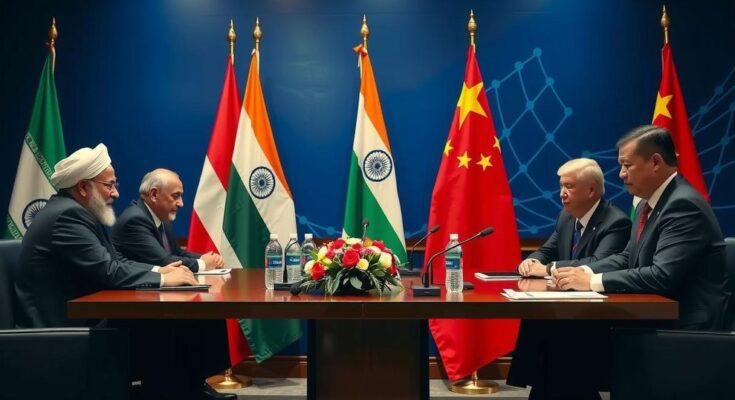Russian President Vladimir Putin hosted the BRICS Summit in Kazan, focusing on creating a “new world order” to counter Western dominance and lessen reliance on the U.S. dollar. The summit highlighted improved relations between China and India, the expanding BRICS coalition, and the call for alternative financial systems in response to Western sanctions. Presentations by member nations emphasized the need for reform in international institutions to support developing countries.
This week, Russian President Vladimir Putin hosted the BRICS Summit in Kazan, Russia, attracting representatives from over two dozen nations to deliberate on establishing a “new world order” that seeks to diminish the hegemony of the West and reduce reliance on the U.S. dollar. This summit, spanning from Tuesday to Thursday, represents Putin’s most significant international platform since the invasion of Ukraine in 2022, as he advocates for an alliance that can escape the constraints of Western-imposed sanctions. During the summit, President Putin remarked that the dollar is being exploited as a weapon against various nations, a sentiment that resonates with several BRICS member states that are eager to diversify their economic partnerships. Among the notable discussions was the easing of tensions between China and India, as both leaders aimed to demonstrate a commitment to enhancing their bilateral relations following a recent agreement to resolve their longstanding military standoff over a disputed area. Moreover, the BRICS coalition, which includes Brazil, Russia, India, China, and South Africa, is rapidly expanding, having welcomed nations such as Iran, Egypt, Ethiopia, and Saudi Arabia earlier this year. The ongoing interest from a range of other countries, including Turkey, Azerbaijan, and Malaysia, highlights the growing influence of this group, which now represents approximately half of the global population and 35% of economic output. Discussions during the summit also centered on the establishment of an alternative payment system to SWIFT, a move aimed at countering the financial sanctions imposed by the West. While Russia promotes a more confrontational stance, key members like Brazil, India, and South Africa advocate for a more constructive approach, focusing on reforming international financial institutions to better serve developing nations. Iranian President Masoud Pezeshkian emphasized the need for BRICS to evolve beyond a basic forum for dialogue, criticizing the West for perpetuating economic sanctions that jeopardize global peace and prosperity. He highlighted the detrimental impact of a monopolistic view held by Western powers, stating that it has led to heightened violence and instability worldwide. Finally, the article reflects on the strategic significance of the continued dominance of the U.S. dollar, with former President Donald Trump warning that potential declines in dollar hegemony could equate to profound geopolitical losses for the United States. The overarching message from the summit is a call for greater cooperation among BRICS nations to challenge Western dominance in global financial and political arenas.
The BRICS Summit convenes annually to unify its member countries—Brazil, Russia, India, China, and South Africa—around a common agenda that promotes economic collaboration and political influence on the global stage. The current geopolitical climate, marked by heightened tensions with Western powers, has prompted BRICS to seek ways to enhance collective bargaining power, particularly in light of sanctions and financial exclusions experienced by some member states. This summit represents a pivotal moment for the alliance as it endeavors to forge a more balanced multipolar world, reduce dependence on the U.S. dollar, and promote alternative financial systems.
The BRICS Summit marks a significant effort by its members, under the leadership of President Putin, to redefine the global economic landscape by decreasing dependency on the U.S. dollar and advocating for a more equitable international order. As member states grapple with the dual challenges of Western sanctions and economic growth, the summit underscores a desire for enhanced cooperation and the creation of alternative systems to challenge existing power dynamics. The evolving allegiances and discussions surrounding BRICS illustrate the shifting global paradigm and the potential for emerging markets to play a more prominent role in shaping the economic future.
Original Source: www.foxnews.com




